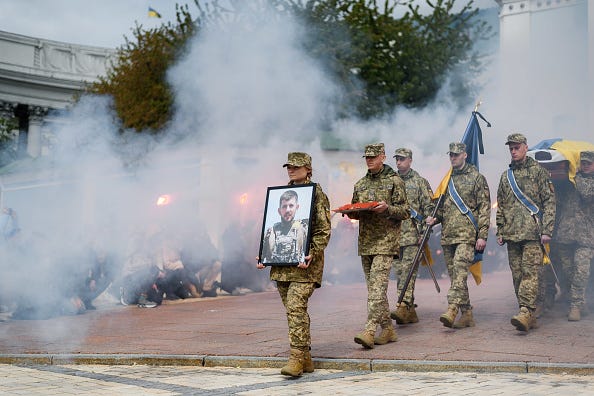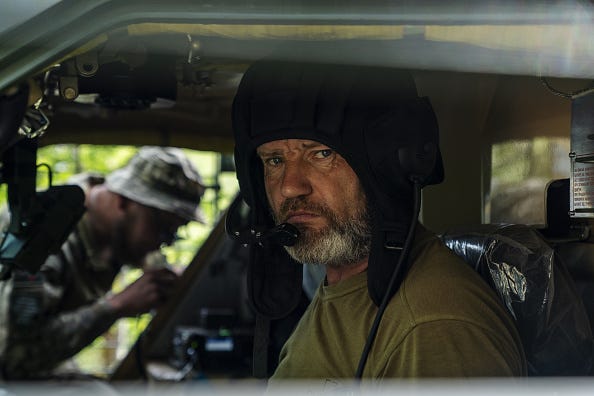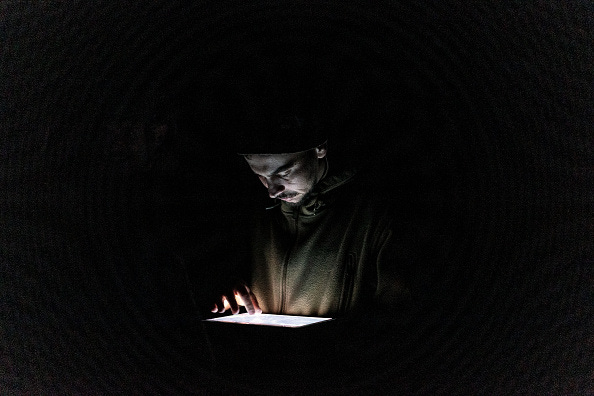Gambling addiction's growing grip on the frontlines
With the problem proliferating, Ukraine has moved to establish limits on gaming, a wartime problem since at least the American Revolution. We profile one soldier struggling with the addiction himself.
Editor’s Note: We cover Ukraine not just as a place where violence is occurring, but a place with its own unique history, culture and people worth reporting on holistically. Agree with us? Upgrade to a paid subscription to help us keep going.
Few would be surprised that Taras*, who spent 18 months on the frontlines storming enemy trenches, is in therapy.
After all, he still has shrapnel lodged so close to his carotid artery that doctors have refused to remove it.
But the main reason he is in therapy is for betting on football.
When Taras’ wife found out about the debt his gambling had racked up, they fought until they ran out of words, and considered a divorce.
The ties binding them together were tested. “We have two kids, you know…”
Taras trails off, pausing before continuing.

But, in the end he was the person she had decided to spend her life with. They would find a way to pay off the loans, she decided, but in exchange he had to stop gambling and lying to her about the debt.
“She said that if I did all that we could go back to living a normal life,” Taras said softly.
I asked when she had said this.
“Many times,” he answered, the heartbreak in his voice audible, “she says she will be fine with [the debt] and I just have to tell her, so we can pay it off. I believe she means that, but I think if I tell her how much debt there is she won’t be able to accept it.”
Until a few months ago nobody really knew how common stories like Taras’ were among servicemen in Ukraine.
On March 29th a petition authored by a soldier, Pavlo Petrychenko, called for the president to deal with the proliferation of gambling in the military. The petition accumulated so many signatures that Zelenskyy directed government agencies to investigate the issue that day.
The petition not only outlined how serious and widespread the problem was, but also the threats posed by gambling addictions.
Some servicemen had been found to gamble away all their money; others turned to pawning military gear, pulling resources away from the war effort. The gambling sites may also pose a national security threat: many are Russian owned, and could exploit the data of Ukrainian servicemen.
The petition also accused the gambling sites themselves of being exploitative, actively targeting servicemen with their use of Armed Forces insignia on advertisements, and with claims that they had donated to the military.
Less than a month later, Zelenskyy enacted new rules regulating gambling sites, limiting online advertising and establishing caps on weekly gambling.
But Pavlo Petrychenko, the author of the petition, had been tragically killed in action 5 days beforehand.

Gambling has long been a problem in the military. During the time of the American Revolution, all soldiers were forbidden from playing cards or games of chance – with the general orders calling them “vice and immorality.” As George Washington wrote in a letter in the 18th century:
“Avoid gaming… the child of avarice – the brother of inequity – and father of mischief – It has been the ruin of many worthy families – the loss of many a man's honor – and the cause of suicide.”
During World War II, the British government attempted to limit sports betting and races, with some seeing it as a “national evil,” inconsistent with the sacrifices needed for victory. Interestingly, like those operating in Ukraine, gambling companies would frequently claim to be donating to ‘war charities,’ although gave little evidence to support this.
As the war turned in the Allies’ favor, betting on greyhounds and football surged. Like George Washington’s efforts to ban gambling, World War II efforts to prevent gambling were only of limited and temporary success.
The Counteroffensive spoke to psychologists to understand what really happens in the brain of a gambling addict, and why it has become such a widespread problem in the military.
Gambling gives you a hit of dopamine, and while people think that dopamine is the ‘happy’ hormone, it’s actually the hormone that leads your brain to expect happiness, explained Igor Hokh, a psychologist in training, specializing in gambling addictions.
Research conducted on gambling addicts has shown that there are two main categories that they can be divided into. The first is the overstimulated gambler: those who feel overwhelmed and need a distraction.
The lifestyle that comes with military work is often unpredictable, and, contrary to what one might expect, mind-numbingly boring. For servicemen that are in combat positions, the intensity that comes with living near the frontline is combined with monotonous waiting.

The other category of gambler is the understimulated gambler. This includes servicemen away from the frontline in non-combat positions, who conduct repetitive administrative work, are often away from their family and similarly have no time off.
The desire for a dopamine hit combined with boredom creates a perfect storm. “When somebody is sitting in a trench all day there are very few ways for them to distract themselves,” Igor added.
Taras’s family left the country, leaving him lonely and lacking support. Left with so much time alone, he it became increasingly hard to control his addiction:
“When I am at home alone, no wife, no kids, these stupid thoughts get in my head like, ‘nobody is controlling you.’”
But Taras is determined to make a change: “I haven’t gambled for a few months… and they are coming home in two months. I think we will be able to pay the debts back by that time, then we can live normally for a while.”

The high salaries soldiers make on the frontline, six-times the national average, are another contributing factor, says Igor Hokh. He adds that cryptocurrencies, and the ease with which people can take out loans in Ukraine, also allow servicemen to gamble beyond their financial means.
Taras finds that financial stress is one of the things that triggers him to gamble:
“I said to my wife ‘you don’t understand what a terrifying illness it is, you get into it and you have more and more debt and you want to gamble more and more to pay it back.’ She forgave me and I gave it up for a few months. I would go to work, come home, play with my kids and not think about it. But at the time I owed a friend some money, he messaged me asking if I could pay it back sooner, and then the feeling of debt came again and I started playing again, thinking I would win some money and pay him back.”
A culture of deep shame around gambling has created another obstacle in combating the problem. Even some military psychologists, like Andriy Koznichuk, had no idea how widespread the problem was in their own platoon until the news of the petition came out:
“I thought, ‘it’s not true, [servicemen] play online casino [games], but it’s not that bad, like it’s not everybody. So I asked my guys about this [gambling] and yes, so many of them were struggling with gambling addictions.”
With resources so stretched in war time, Ukraine is struggling to deal with the problem. Mental health services are known to fall short of meeting the needs of servicemen, and there are simply not enough military psychologists to go around, so often servicemen will turn to military chaplains for support.
As one military chaplain, Ruslan Boyko, told me, psychologists and military chaplains are not dissimilar: they both deal with consultation and confession.
Serhiy, a military chaplain who was recommended to me by Andriy as one of the most effective in his field, spoke to The Counteroffensive about his experience speaking to servicemen struggling with gambling addictions:
“90 percent of the servicemen struggling with addictions now are ones that had them before the military, but, a lot of them, due to the conditions they live in and what their life is like, have relapsed.”
*Taras’ name has been changed to a pseudonym upon his request.
AFTER THE PAYWALL: The Ukraine peace summit is underway in Switzerland. We get you up to date on the latest communiques, Russia’s demands, and Ukrainian retorts. In reporter’s notebook, Alessandra visits with a military chaplain to understand their role in mental health. Plus our dog of war!
Keep reading with a 7-day free trial
Subscribe to The Counteroffensive with Tim Mak to keep reading this post and get 7 days of free access to the full post archives.






